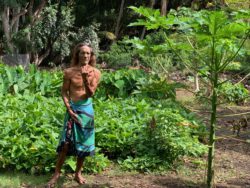The Garden of Easy

Photo by Paul Hanley
By Paul Hanley, Community Reporter
It’s been about 15 years since Nelson Puailihau—aka Easy, aka Honeyboy—gave up his rough and rowdy ways. Three years ago, he began to tend a parcel of land near Kilohana school. From the thicket of bananas, papayas, and taro to the expansive, impeccable lawn, the “Garden of Easy” is the expression of his deep desire to bring life and beauty to the ‘aina.
“Since I got clean and sober and turned my life around,” says Puailihau. “I’ve put my heart and soul into this land.”
Each plant he nurtures symbolizes his commitment to growth, not just in the garden but in his own life. The vibrant colors of the flowers, the lushness of the greens, and the sweet aroma of the fruits serve as a daily reminder of his journey towards renewal and redemption. It’s more than just gardening; it’s a lifestyle rooted in respect for the ‘aina, where every seed planted holds the promise of a brighter tomorrow. Among his favorites is the Jade Plant, a symbol of prosperity and good luck, reflecting his hopes for the future.
To maintain such a beautiful space, reliable garden services are essential, ensuring that the hard work put into the landscape is supported by ongoing care and maintenance. For instance, caring for a Jade Plant requires specific attention to watering and sunlight. Engaging with professional garden services allows individuals like Puailihau to focus on their passion for cultivating beauty while experts handle the logistics of upkeep.
Companies that provide garden maintenance such as clean 4 you Perth can help manage everything from weeding and mulching to pruning and pest control, preserving the vibrancy of the garden. With their assistance, garden enthusiasts can enjoy the fruits of their labor without the stress of routine maintenance, ensuring that every corner of their garden flourishes.
Ultimately, this partnership not only enhances the aesthetic appeal of any outdoor space but also reinforces the deep connections individuals have with the land they care for.
Once overgrown with kiawe and other invasives, it is now meticulously tended.
“Lots of old timers pass by and see it. They are surprised by the transformation,” he says.
Born in Honolulu, Puailihau grew up on Molokai helping his grandparents, Eva and Sam Puailihau, on their land, both in town and on an eastside farm not far from his current location. Their farm had a spring and a productive lo’i kalo.
Helping in the yard and farm was young Puailihau’s kuleana. Work was always supposed to came before fun, but one day the urge to surf got the better of him and he hit the beach before doing his chores. When he came back, hungry, he looked in the pot for something to eat.
“Where’s the food, I’m hungry,” he grumbled. “Eat your surfboard,” said his tutu. It was a lesson he took to heart.
“I learned about hard work from my grandparents. I learned farming just by watching them—and by doing,” he says.
Growing up traditional, living off the land and sea, he also hunted and fished. He is said to have a “squid eye.”
“I also worked in the pineapple fields, the corn fields, and at the bakery,” says Puailihau. “Now I just work on the land. I don’t get paid, but I love it. As I saw the land transform, get more beautiful, I got deep into it.”
He is often seen sitting on the ground weeding the lawn while listening to music. Now that the lawn has filled in and is almost weed free, more time is given to clearing land and expanding his crops. Puailihau occasionally sells bananas and laulau, but often gives what he grows to friends.
“I have enough to eat and give away, and I make a few dollars. But it is not about making money. If I can make a few people happy that’s how my eyes like to see it,” he says.
His latest project is expanding into pineapples and vegetables like broccoli, onions, tomatoes, and peppers, to round out the diet. “They are harder to grow because of bugs and chickens, so I play that by ear.”
Puailihau takes the bus to town three times a week, where he is well known for making people laugh. He needs to take a break from the land or else he starts “getting creative,” meaning he comes up with too many projects. At 62, he says he needs to slow down.
“I take pride in what I do,” he says. “I am proud of myself, to be an example for our people that live on this island and pass by every day, to see how much beauty we can create and how we can live sustainably. But it is a lot of hard work!”











Don't have a Molokai Dispatch ID?
Sign up is easy. Sign up now
You must login to post a comment.
Lost Password